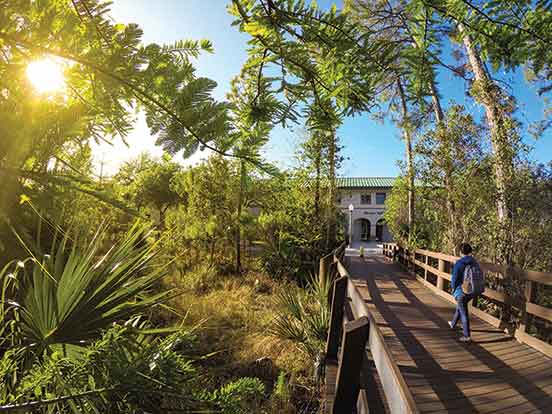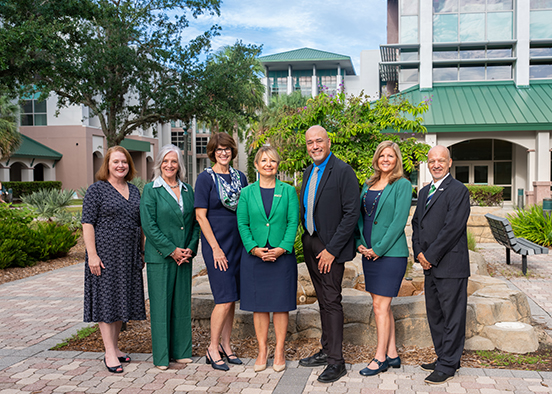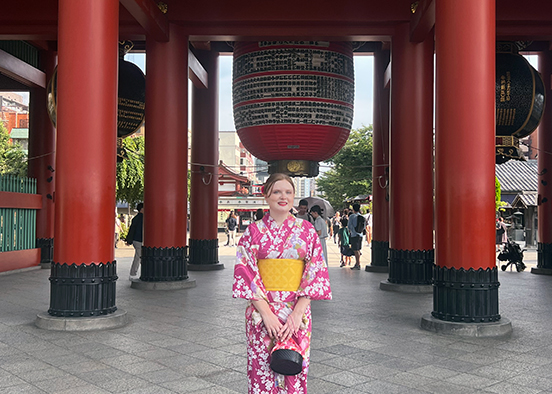Students gain experience, career connections via Lee Health internships
Three Florida Gulf Coast University students recently completed internships with one of Southwest Florida’s largest healthcare systems through a program designed to give them real-world experience and a foot in the door for future career opportunities.
The paid internships at Lee Health were made possible through a unique educational pathway that combines a special topics course, “Design Thinking in Health Care,” with an associated micro-credential. Open to all majors and class years, this sequenced track equips students with practical skills in human-centered design and public health strategy.
At the end of the course, students can pursue the micro-credential that guarantees an interview with Lee Health, offering a direct and supported entry to career shadowing, paid internships and employment opportunities.
It’s just one of the ways FGCU is elevating community partnerships for regional impact, in line with the university’s 2024-29 Strategic Plan.
Human-centered design is a structured approach to problem-solving that begins with the people most affected and focuses on their individual needs, frustrations and goals, said Rachel Walter. An adjunct instructor in FGCU’s Marieb College of Health & Human Services, she created the program in 2020.
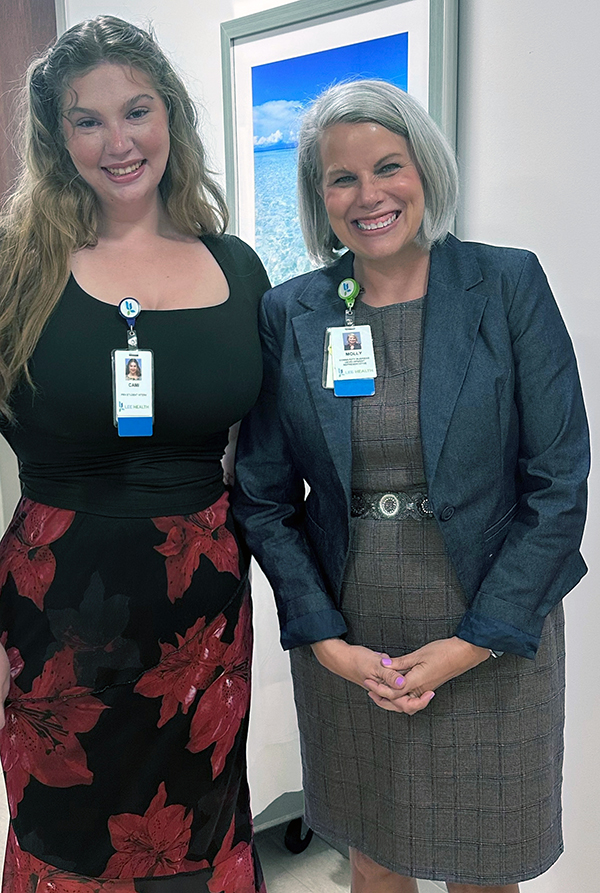
“While it may sound intuitive, this approach is often missing in healthcare, where solutions are frequently developed without meaningful input from patients or communities,” said Walter, an FGCU alum whose full-time job is with Lee Health’s strategy and innovation team.
“A familiar example is how Netflix recommends shows based on your preferences or how an iPhone feels intuitive to use. Both are built around the user experience.”
The course brings a similar approach to public health settings, she said. “For example, one of last year’s student projects was a concept featuring a church-based exercise program for older Hispanic women who felt excluded from traditional fitness settings,” Walter said. “This approach contrasts with the one-size-fits-all mindset that dominates much of healthcare today.”
On the inside track to careers
Participating students say the internship and their classroom and laboratory experiences are setting them up for successful careers after graduation.
Fort Myers native Cameron Schram, a senior majoring in management, served in Lee Health’s physician relations and business development department during her internship. She provided website support, offering feedback on areas for improvement and updating the speaker’s bureau.
“I also attended numerous networking events to expand my professional connections. To gain a comprehensive understanding of the system, I participated in various meetings and shadowed employees in different departments that aligned with my interests. Additionally, I utilized the opportunity to explore various career paths,” said Schram.
She hopes to become a recruiter at Lee Health after graduating and work toward a physician recruiter role.
She credits the course for opening the door to her first internship at Lee Health, where the relationships she built led to a second internship that allowed her to further develop her expertise within the system. Professional development classes also enhanced her professional skills and expanded her network. The recent human-centered design course and internship are the icing on the cake, she said.
“My internship at Lee Health was highly beneficial. It allowed me to work with my dream company and gain insights into the organization’s operations,” Schram said. “This experience has equipped me with the knowledge and skills necessary to become a valuable asset to Lee Health in the future.”
Seeing patient’s point of view
During her internship, Allysen Corporan, an Honors College senior from Cape Coral majoring in psychology, helped identify community pain points, designed wellness and outreach programs, assessed programs internally to ensure project success and collaborated with departments systemwide to provide holistic care.
“This experience deepened my passion for preventive care, having had the opportunity to help plan programs grounded in real community needs. As an aspiring clinician, it’s very easy to become familiar only with your immediate environment — in-session, direct patient care,” Corporan said.
“Through this internship, I was able to objectively define healthcare in terms of accessibility. I was able to take a step back from viewing patients as ‘patients’ and instead address their needs from a community standpoint,” she said. “Patients may be admitted to the hospital when they’re in the most pain or distress, but what barriers do they face in their lives that keep them from staying healthy?”
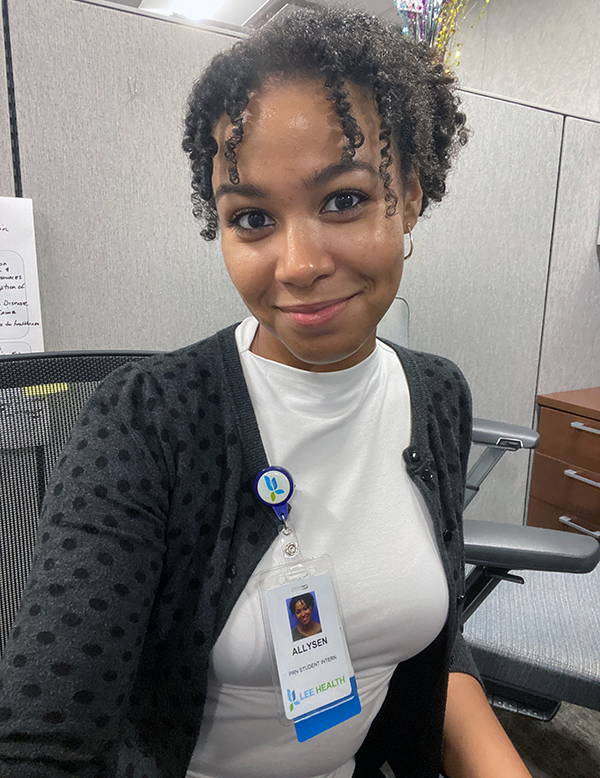
For example, some diabetes patients might encounter geographic or socioeconomic obstacles to healthy foods, while other patients might face language barriers that render healthcare inaccessible and intimidating.
“Having experience identifying these unique, consumer-based needs and building health programs to address real community barriers has prepared me to deliver exceptional patient care,” said Corporan, who hopes to pursue a master’s degree in occupational therapy after graduation.
From student to colleague
For instructor Walter, guiding students at her alma mater through her job at Lee Health has proven to be a powerful experience personally and professionally.
“I get to live in both worlds — one foot in industry, one foot in academia. Being able to bring those two together and to help students see where they might fit in an industry that needs new ideas and fresh energy is something I’m really proud of.
“One of the most rewarding parts is watching students grow confident in a new way. They’re used to exams and papers. But here, they’re asked to think critically, collaborate and create something meaningful. In the process, they’re also building practical real-world skills they can carry into any workplace,” Walter said. “As they rise to that challenge, we become colleagues. The shift from student to emerging professional is what makes this work so meaningful.”
Latest FGCU News
- Meet the FGCU professor playing in everyone’s backyard
- A closer look at native plants blooming seasonally across campus
- 3 new President’s Cabinet members helping shape FGCU’s future
- New institute advancing sustainability, resiliency planned in Charlotte County
- Japan dream becomes reality for Eagle abroad
- 3 wildlife predators that signify a healthy campus ecosystem








